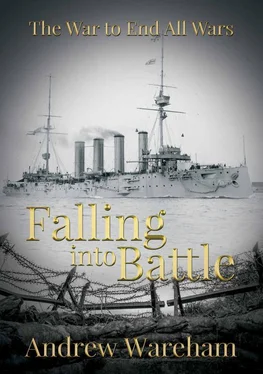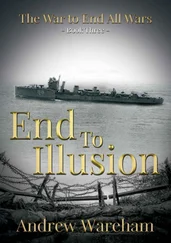It wasn’t what he wanted; nonetheless, it could be the making of his career, even if a different one to the course he had plotted out for himself. Presumably Captain Ironside had made the recommendation and the Admiralty had conformed – a senior captain would generally be listened to and Ironside must be due his rear-admiral’s flag. It was in many ways a plum posting, hard and one that was only offered to the best of sublieutenants, those who were out of the ordinary run of things.
He wondered why he was to talk to his trustees. They were a firm of lawyers, he knew – trustees normally were. They had never contacted him personally before. They had sent him from his school to Dartmouth, informing him by letter that he was to take the entrance examination, which his school had prepared him for without ever mentioning that they were so doing. Thinking on it, there was a possibility that he had an income which they might intend to make him free of – the school must have charged fees. They had supplied him with pocket money at Dartmouth, a Postal Order for a few shillings each term, which he had hardly made use of, not having a sweet tooth. He knew nothing of his parents except for a vague understanding that they had died in the colonies when he was very young.
He came to attention, made a precise about turn and led the way out of the office, last man in the first out.
“I say, Sturton, a destroyer, old chap! Rather dashing, what?”
“I had rather it had been a battleship, Adams. I envy you that!”
“Yes, jolly good luck, that. Iron Duke as well! The newest of the superdreadnoughts! Off to my tailor first thing, old chap. New uniforms, of course, and two trunks of mufti – must be equipped for the social life on a flagship, you know.”
“So you must – that is one part of your new existence I don’t envy, old fellow. I shall stand back in awe as the smarts dash by, I don’t doubt!”
McDuff laughed, something he did frequently, and said that he would not be worried that way either.
“Down in the depths of the South Atlantic. Not much social life for me.”
“Gold mining magnates, McDuff! Cape Town is full of them, and all looking to rise in the world – five years and you could be wed into millions, my boy!”
That had happened before, they knew, a naval uniform leading to a rich colonial marriage.
“Retired from the sea and overseeing a thousand kaffirs instead. Better than kowtowing to an admiral’s whims, Adams!”
They laughed together, the three swaggering, confident, the first great hurdle leapt, their commissions achieved. They ignored Baker, pasty-faced and trailing at their heels; there was no place for also-rans in the Navy.
The four reported to the Gunroom sublieutenant, asking him the procedure for leaving the ship.
“Go to the Paymaster’s Office and pick up your papers and your outstanding pay, then it’s off you go. You as well, Baker. McDuff, you are to take passage for South Africa from Portsmouth next week, probably on Glasgow light cruiser which is joining your squadron.”
“I shall spend a few days in London then, sir – a last taste of civilisation.”
Two hours and they were at the Dockyard Station on the pier overlooking HMS Victory , waiting for the train to Waterloo, the three laughing together and making a noise that attracted generally favourable attention – happy youngsters off on another stage of the great adventure.
Baker waited for the same train, down the platform from them, fretting and wondering what was to happen to him; his father would not be pleased, he suspected. His father had made much of the ‘opportunity’ his son had – he was to become one of the gentry rather than a mere monied man. His boy’s failure would not be well received. He would be lucky not to be cast out from the family – was it not for the absence of any brothers, he had no doubt that would occur. He cheered up as he realised that he could not be disinherited for lack of an alternative heir – who could take the old man’s money in his place? The old man would shout at him, but in the end he would have to find something for him, doing nothing too demanding, he hoped. Money always passed down to the eldest son, he was sure – it always happened that way among the gentlefolk.
Simon stared at the brass plate beside the imposing marble and glass doorway, in the City, in sight of the Bank at Threadneedle Street. Judging by the offices, the partnership of Aitkens, Aitkens and Trim was fashionable and profitable – which left him even more puzzled.
Who was he?
All he knew was that he had no living relatives and had gone off to school – where he had been treated well enough – and then been sent willy-nilly to Dartmouth. He had no objections to that latter – he liked the Navy and had every hope of retiring as an admiral, flying his flag over a battle fleet. He was in the right place at the right time as well – the word was that war with Germany was inevitable, must come within a year or two. Nothing like a good war early in a man’s career!
He walked up the two steps and into the hallway, addressed the commissionaire sat in an open kiosk just inside.
“My name is Sturton, Sublieutenant, RN. I have been instructed to report here to speak to my trustees.”
“Yes, sir. Your name is on my list. I will have you taken to see Mr Secombe.”
The commissionaire rang a bell and an office boy appeared from the rear and was given his instructions.
“Follow me, if you please, sir.”
One pair of stairs and Simon was led into a large front-facing office. The room was light and airy and modern, brightly wallpapered, not dingily respectable in buff paint as one expected of a lawyer. A young man no more than five years his senior rose and greeted him, offered a chair.
“Thank you for coming to see us, sir. My name is Secombe and I am a partner. The business could have been dealt with by letter, but my masters thought it desirable to explain all face to face. First of all, sir, having successfully attained commissioned rank, your income is to rise to about nine hundred pounds per annum. It is the return on investments in safe stocks and bonds which your trustees manage for you. The capital sum is about twenty thousand pounds and becomes yours at age twenty-one according to the terms of the trust fund.”
It was a comfortable amount of money – more than sufficient to live well on.
“What would have happened if I had not achieved promotion, Mr Secombe? Or if I had failed the entrance examination to Dartmouth?”
“In case of either failure, sir, the trustees were instructed to purchase a small farm; you would have become an obscure agriculturalist in the depths of rural England. I believe Herefordshire was considered ideally bucolic. You have spared yourself that fate, sir.”
Simon smiled – it was not a life he fancied for himself.
“I know nothing of my background - of my antecedents, one might say, Mr Secombe.”
“Exactly so, sir. That is the other part of my duty this day, sir. In brief, your mother was the daughter and eldest child of a banker, Mr Nathan Isaacs; the firm is what is known as a merchant bank and it is powerful in the City. Your father, Mr John Sturton, was second son to Viscount Perceval, a minor political figure in late Victorian years, now active only on his estates, deep in the West Country in Somerset and Dorset. Neither set of parents approved of a match between the two - Jew and Gentile, political aristocrat and banker. The wedding was forbidden, they were to see each other no more. Both were of age and they eloped and married – it is presumed – in Canada. They made a life in the far west of the Dominion – some sort of farming, one understands - and lived there for some three years, in which time you came along. They died of an outbreak of fever which swept through the region. You survived and were brought to the attention of the authorities, identified and in due course sent back to Britain. The grandparents created the trust fund and an establishment for you and agreed that you were to be a naval gentleman. They made no other contact with you, or with each other, and have shown no desire to do so, sir.”
Читать дальше












